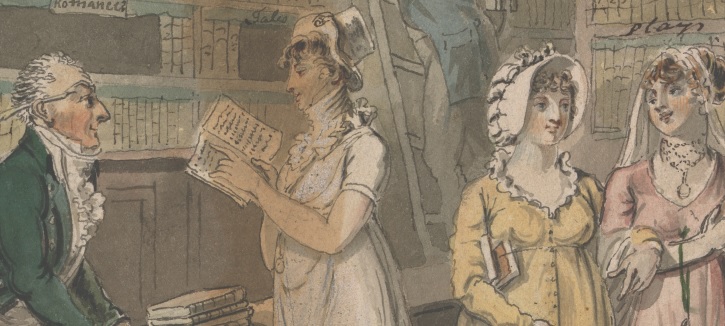
Elizabeth Neiman introduces her new book, Minerva’s Gothics: The Politics and Poetics of Romantic Exchange, 1780-1820.
Between 1790 and 1820, William Lane’s London printing press Minerva published an unprecedented number of novels, many by obscure female authors. Because Minerva novels catered to the day’s fashion for sentimental themes and Gothic romance, they were and still are generally dismissed as formulaic ephemera. By showing that Minerva’s formulaic conventions draw obscure novelists and their more esteemed contemporaries alike into a shared circuit of production, Minerva’s Gothics: The Politics and Poetics of Romantic Exchange, 1780–1820 rethinks the press’s position in literary history.
Well before I began my research, Minerva had left a visible imprint on literary history in two ways. First, contemporary critics derided Minerva, leaving a trail of commentary, e.g. ‘those ladies who assiduously feed the pig-stye of literature in Leadenhall Street’ (Critical Review, 3rd ser., 3 (December 1804), 470–1). Armed with such comment, I was able even very early on in my research to raise a laugh at conference presentations – but what took me a lot longer to fully weigh was how and why I had found my way to Minerva in the first place. In other words, although remarks like these illustrate that Minerva impacted the literary market, until relatively recently nobody had paid any attention to these sorts of comments at all. This brings me to my second point regarding just how visible Minerva was in some of the most cutting-edge scholarship of the late 1990s and 2000s (e.g. Emma Clery; Deirdre Lynch; Michael Gamer).
As I explain in Minerva’s Gothics:
Recently, scholars interested in historicizing Romantic conceptions of genius and authorship have begun to write Minerva back into literary history. Minerva is said to elicit Romantic ‘anxiety’, Lucy Newlyn’s term for the period response to popular print culture that was to redefine literature as imaginative, individually authored, and above all, distinct from all other forms of writing.
Romantic ‘anxiety’, while it is a valuable concept, is only one of many points of exchange among Minerva novelists and their more esteemed colleagues, most notably first-generation Romantics William Wordsworth, Mary Wollstonecraft and William Godwin – as well as Percy Shelley, who was deeply influenced by the other three. My intent is twofold: it is to expand what we can see about Minerva’s formulaic novels, while showing how canonical Romantic-era texts look different when read in light of Minerva’s shared circuit of conventions. The discussion features three interrelated sections, each of which shows how novelists rework formulaic conventions over Minerva’s run, so to enter contemporary debates over women’s nature, the social order, and most importantly the very Romantic redefinitions of authorship and literature that still render their novels practically interchangeable or ‘already read’. Canonical Romantic poetics represents the poet as free to shape his habits of mind and thus feelings – this imagined ideal projects freedom as liberty from constraint, a gendered ideal to be sure, but an ideal nonetheless. Poststructuralism has famously deflated the myth of the writer who transcends his day. Constrained by popular conventions, but also privy to Romantic ideas about freedom and subjectivity, Minerva novelists write a Romantic-era alternative to ‘genius’. Minerva novelists show that freedom and servility need not be diametrically opposed. Because Minerva’s popular conventions convey powerful (because shared) feelings and habits of mind, they both limit what can be said whilst at the same time provide opportunities to rethink the possible.
Elizabeth A. Neiman is Assistant Professor at the University of Maine, with a joint appointment in English and Women’s, Gender, and Sexuality Studies. Her research interests include the British Romantic era, women’s writing, the long-nineteenth century, and book history.


